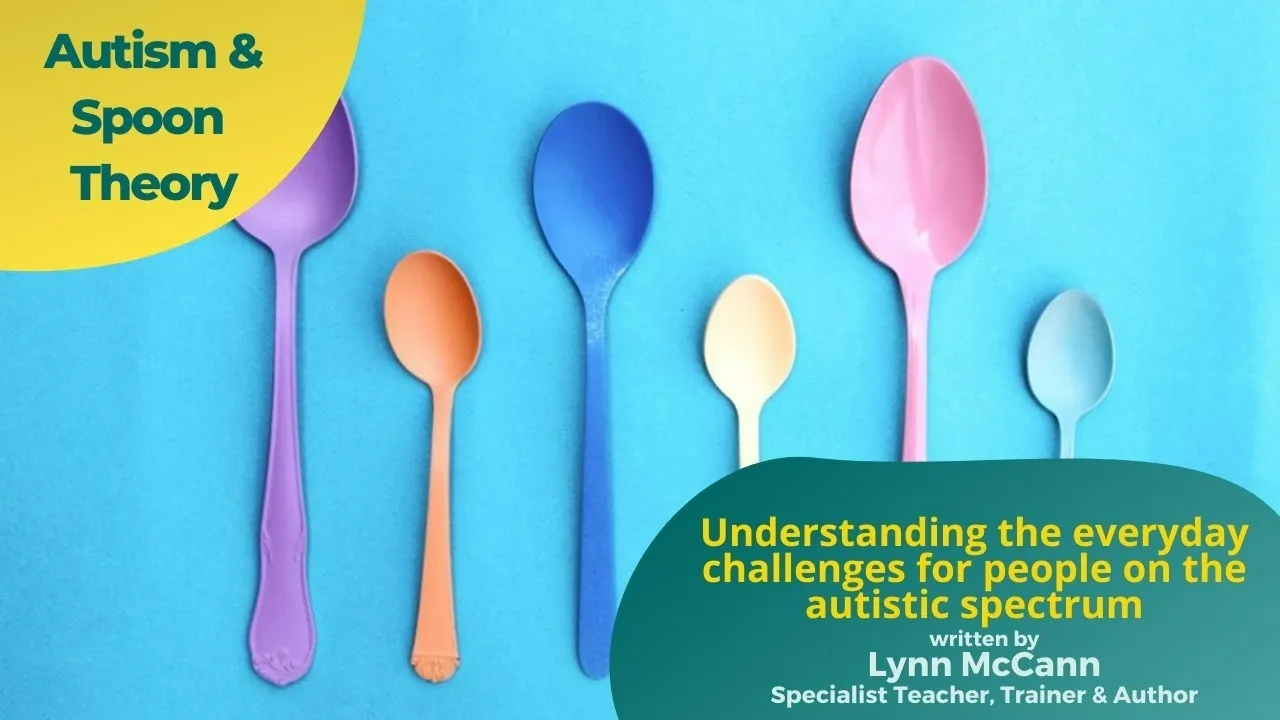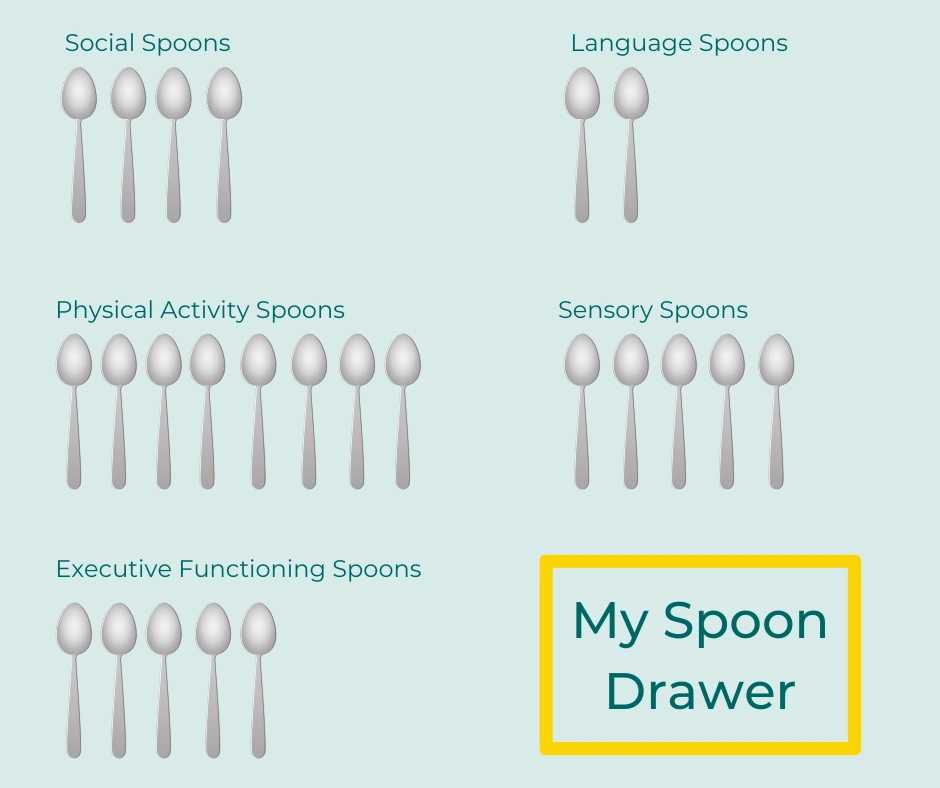Spoon Theory & Autism
Apr 06, 2021
Written by Lynn McCann on Reachout ASC
My friend @AnnMemmott who blogs at Ann's Autism Blog first introduced me to the Spoon Theory in relation to autism. It was originally created by Christine Miserandino when asked about her chronic illness, (you can read the original post here) but is a great way of helping us understand why school is such hard work for children with autism. @aspiemusings has also written a good post about how it relates to her as an autistic adult.
What is Spoon Theory?
Let's imagine that the social and intellectual energy a child has each day can be measured in spoons….
A child with autism can start the school day with a full drawer (which may be only half as full as a typical child) or with some of their spoons already used up in dealing with the demands of getting to school. Depending on various factors such as whether they slept, if mum remembered to say goodbye the right way, if their clothes are itching their skin, if their routine was changed, or any number of other seemingly incidental events…they may be starting the day with, say, only 5 spoons instead of 10.
Then they need to start using their spoons. Each set of instructions, each set of work demands, each time they have to organise themselves, follow a complex set of instructions or cope with change, and each social interaction may cost the child a spoon. If there are sensory sensations that are overwhelming, then another spoon is used up in regulating and keeping calm. If the child has to work in a group more than one spoon may be needed. Break times are not relaxing, another spoon or two is used up in coping with all the social interaction, noise and lack of structure. Some children manage to save a spoon by shutting off, taking the time to be alone, so that they can cope with the next set of lessons.
I hope you can see what might be happening here.
When there are no more spoons...
Do you have a child who seems okay in the morning but always seems to lose it in the afternoon? Or you have a child who won't join in anything at break times and paces around the perimeter of the playground? Or a child who seems to be having frequent meltdowns some days but is fine on other days? Or parents ask you what you are doing to their child as they always have a meltdown as soon as they come out of school? And getting them to do homework is impossible.
You might assume you need more structure in the afternoons. You might assume you need to teach the child some social skills so they can make friends at break times. You might assume the parent isn't disciplined enough. You might put all kinds of practical support in place, but it doesn't really work.
Or it may just be that the child has used up all their spoons. They have no communication, organisation, sensory, social or intellectual energy left. They might just be able to keep it together in the morning, but then are far too exhausted to carry on in the afternoon. Some days there may be no spoons to deal with the things they usually seem okay with. They might even be able to keep it together through the day but cannot contain themselves in the safety and familiarity of their home. Some children even manage to borrow spoons from the next day but there will be a day when there are no spoons left to borrow and the child has a major meltdown.

Credit: Adapted picture from https://musingsofanaspie.files.wordpress.com/2014/10/my-spoons.jpg
What can we do to help?
We can help by recognising the limited amount of spoons a child with autism may have. We can help them conserve their spoons to last through the day and we can help them find ways of finding ways to add to their supply (not as easy as it sounds). Through:

Essentially, we can boil these strategies down to one key component: Think about adjusting the demands on the child according to the tolerance and energy they have available, (i.e., spoons they may have left)!
If you understand the child and they can trust you, they will feel safe, they will feel understood and they will be able to cope with more challenges than you might have thought possible. Maybe you should keep a couple of spoons on your desk with the child's name on, and remove one when things are not going so well for them. Then think about how you would cope with just one spoon left and no way of buying any more…
Autistic children and young people often face a range of challenges in school often putting them at additional risk of experiencing Emotional Based School Avoidance (EBSA). If EBSA is an area which you're supporting Children and Young People with, we've been fortunate to work with Dr Jerricah Holder on her EBSA Horizons courses for Educational Psychologists and School Staff.
FOR SCHOOLS:
EBSA Horizons School Staff Training
EBSA Horizons School Training is a comprehensive CPD course for School Staff, which develops understanding and skills (alongside a lot of resources) to support children and young people experiencing difficulties attending school. This course has recently been updated with a new chapter.
Find out more about EBSA Horizons School Training here and register your interest to receive 3 FREE resources from this course.
Family Horizons: Nurturing School Engagement and Wellbeing
Family Horizons offers parents and carers on-demand access to practical strategies, knowledge, and tools across five carefully structured chapters. From understanding attendance challenges to supporting anxiety and promoting family wellbeing, the course brings together professional expertise with real family experiences.
Find out more about Family Horizons here.
FOR PROFESSIONALS:
EBSA Horizons Professionals CPD
EBSA Horizons is a comprehensive CPD course for EPs and other professionals who support schools, which develops understanding and skills (alongside a lot of resources) to support children and young people experiencing difficulties attending school. This course has been recently updated with new chapters.
Find out more about EBSA Horizons here and register your interest to receive 3 FREE resources from this course.
FOR LOCAL AUTHORITIES & MATS:
EBSA Horizons Partnership Framework
A Local Authority wide Emotionally Based School Avoidance (EBSA) initiative to improve attendance and wellbeing in schools.
Providing training and resources for all LA professionals, school staff and parents/carers.
Find out more about the EBSA Horizons Partnership Framework here.
Stay connected with news and updates!
Sign up to receive updates, resources, inspiring blogs and early access to our courses.
Don't worry, your information will not be shared.





